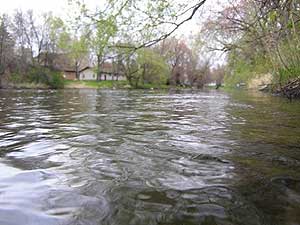|
Audio
Photos
Resources
|
August 8, 2005
The small Wright County town of Annandale is poised for growth. Sitting between the Twin Cities and St. Cloud, the community is attractive to commuters. And because it's nestled among dozens of central Minnesota lakes, the town also draws retirees. But any serious growth in Annandale is on hold, while a legal fight drags on over the town's new wastewater treatment plant. On Tuesday The Minnesota Court of Appeals has overturned a state decision allowing the cities of Annandale and Maple Lake to build a wastewater treatment plant.
Annandale, Minn. — (This story was updated at 2:49 p.m. on August 9, 2005 to reflect the Appeals Court decision )
Sitting in Annandale's municipal park, as a chilled breeze blows off Pleasant Lake, Mayor Sam Harmoning says it's easy to see why she loves this town. Harmoning says Annandale has plenty of small town charm: good schools, quiet tree-lined streets, and an old fashioned downtown. But the city of 3,000 is ready to grow.
It's located in a rapidly developing corridor between the Twin Cities and St. Cloud. With plenty of affordable land, Harmoning says this is a good place to build new homes. She'd love to welcome legions of new families into the community. But right now she says that's not possible.
"It's very difficult to tell people our borders are closed. And that's what we're telling people: you can't come here," Harmoning says.
Annandale can't grow until it builds a new wastewater treatment plant. Over the past five years, officials here and in the neighboring community of Maple Lake, have worked together to plan a joint facility for the two towns. Last year the Minnesota Pollution Control Agency approved the $11 million project.
A St. Paul based group, the Minnesota Center for Environmental Advocacy, objected to the plan. As allowed under the permitting process, it took its objection the Minnesota Court of Appeals. According to the environmental group's Chris Sigford, the organization's stance is simple: the new wastewater treatment plant would violate the federal Clean Water Act by putting phosphorous into the Crow River. Sigford says the Crow is already polluted.
"When you have a lake or stream or river that's got too much of a pollutant in it already and it's impaired, you're not supposed to put more of that pollutant in the water body until you have developed and adopted and implemented a plan to clean it up," Sigford says.
The Court of Appeals agreed, saying the new plant would further pollute the Crow River, and that the MPCA was wrong in approving the project. One appeals court judge dissented, saying he thought under the Clean Water Act the MPCA acted appropriately.
Sigford says her group isn't trying to cause trouble for the towns of Annandale and Maple Lake. Rather it wants the state to take responsibility for developing plans to clean up dirty waterways, or at least not make them worse.
MPCA officials say they're doing their best to develop those plans. And they say if you take the Crow River as a whole, things aren't so bad. The new wastewater treatment plant would release pollutants, like phosphorous into the Crow. But at the same time, another plant upstream at Litchfield has reduced the amount of pollution in the river. The MPCA's Marvin Hora says that means overall the new plant at Annandale and Maple Lake, wouldn't increase the river's pollution level.
"Our goal truly is not to worsen the impaired waters at all. The point sources that are approved that would add small amounts, are offset within the water shed by other reductions," Hora says.
Back in Annadale, Mayor Sam Harmoning feels like all eyes are on her town's legal fight over wastewater. And she says other growing Minnesota communities should pay close attention, because wastewater treatment is the key to the future.
"There are just so many communities that are seeing growth. They're all looking at expansion or construction of wastewater treatment plants, and they're all waiting. We're not the only city that will be questioned on this issue," Harmoning says.






